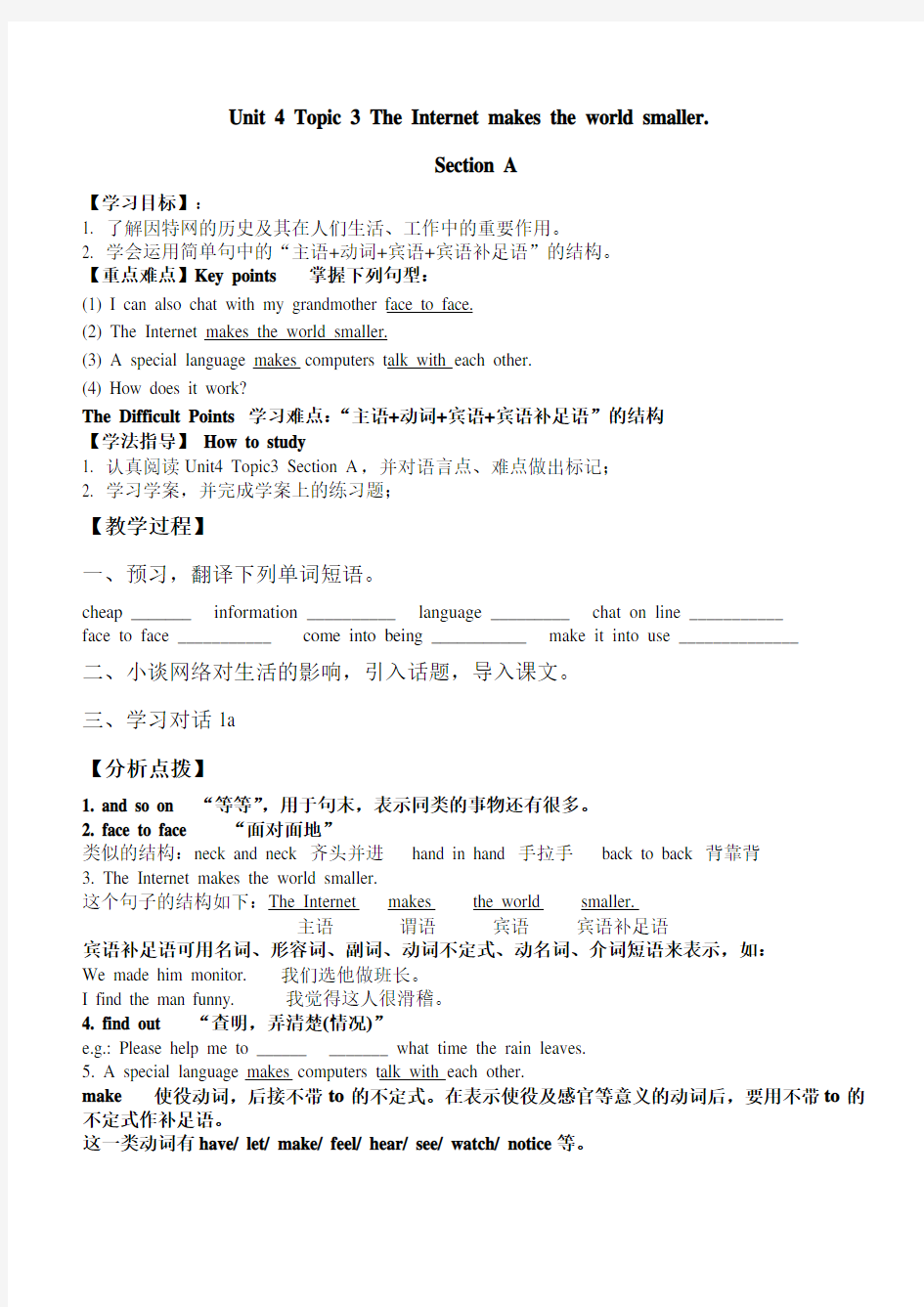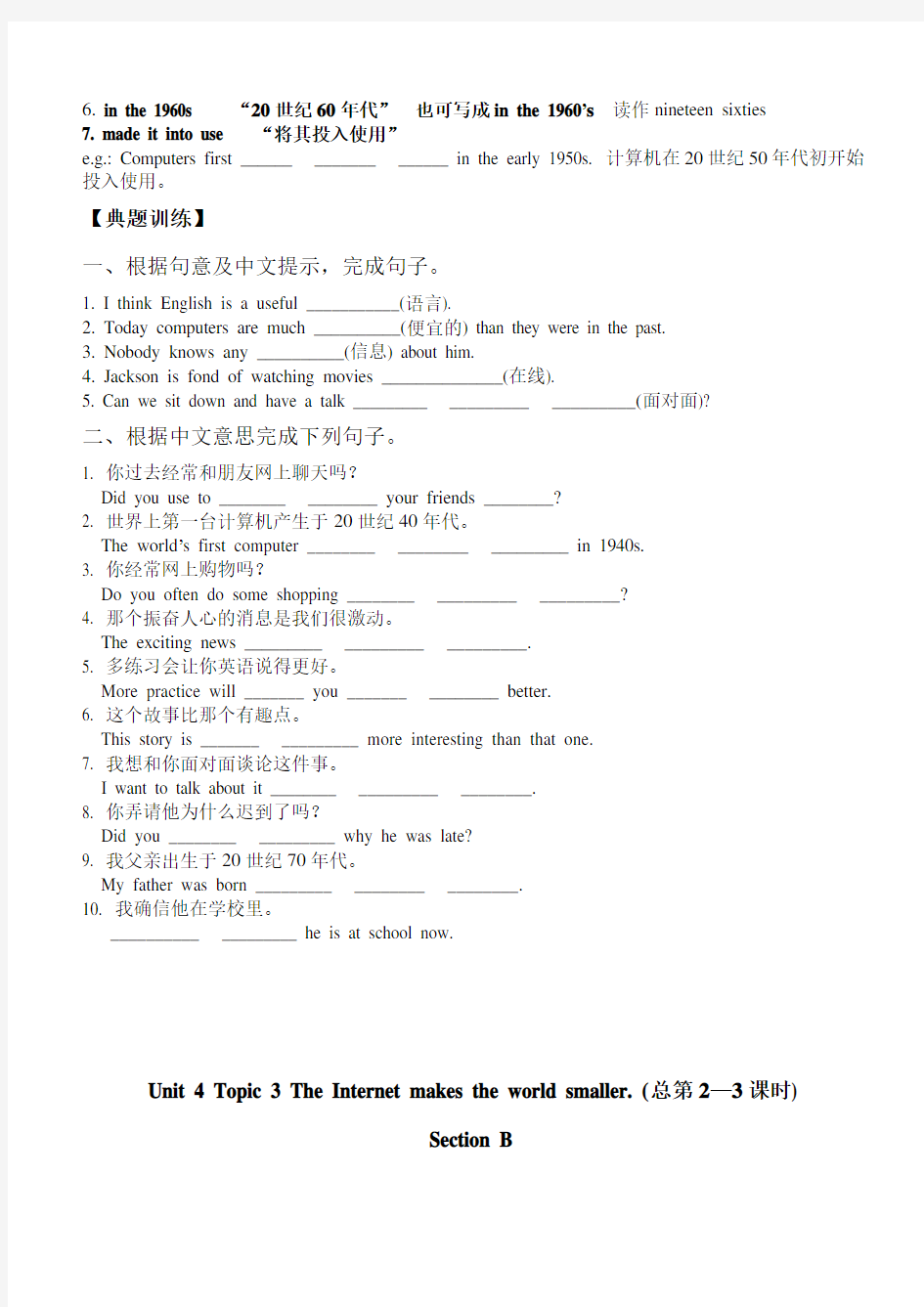

Unit 4 Topic 3 The Internet makes the world smaller.
Section A
【学习目标】:
1. 了解因特网的历史及其在人们生活、工作中的重要作用。
2. 学会运用简单句中的“主语+动词+宾语+宾语补足语”的结构。
【重点难点】Key points 掌握下列句型:
(1) I can also chat with my grandmother face to face.
(2) The Internet makes the world smaller.
(3) A special language makes computers talk with each other.
(4) How does it work?
The Difficult Points 学习难点:“主语+动词+宾语+宾语补足语”的结构
【学法指导】How to study
1. 认真阅读Unit4 Topic3 Section A,并对语言点、难点做出标记;
2. 学习学案,并完成学案上的练习题;
【教学过程】
一、预习,翻译下列单词短语。
cheap _______ information __________ language _________ chat on line ___________
face to face ___________ come into being ___________ make it into use ______________
二、小谈网络对生活的影响,引入话题,导入课文。
三、学习对话1a
【分析点拨】
1. and so on “等等”,用于句末,表示同类的事物还有很多。
2. face to face “面对面地”
类似的结构:neck and neck 齐头并进hand in hand 手拉手back to back 背靠背
3. The Internet makes the world smaller.
这个句子的结构如下:The Internet makes the world smaller.
主语谓语宾语宾语补足语
宾语补足语可用名词、形容词、副词、动词不定式、动名词、介词短语来表示,如:
We made him monitor. 我们选他做班长。
I find the man funny. 我觉得这人很滑稽。
4. find out “查明,弄清楚(情况)”
e.g.: Please help me to ______ _______ what time the rain leaves.
5. A special language makes computers talk with each other.
make 使役动词,后接不带to的不定式。在表示使役及感官等意义的动词后,要用不带to的不定式作补足语。
这一类动词有have/ let/ make/ feel/ hear/ see/ watch/ notice等。
6. in the 1960s “20世纪60年代”也可写成in the 1960’s读作nineteen sixties
7. made it into use “将其投入使用”
e.g.: Computers first ______ _______ ______ in the early 1950s. 计算机在20世纪50年代初开始投入使用。
【典题训练】
一、根据句意及中文提示,完成句子。
1. I think English is a useful ___________(语言).
2. Today computers are much __________(便宜的) than they were in the past.
3. Nobody knows any __________(信息) about him.
4. Jackson is fond of watching movies ______________(在线).
5. Can we sit down and have a talk _________ _________ _________(面对面)?
二、根据中文意思完成下列句子。
1. 你过去经常和朋友网上聊天吗?
Did you use to ________ ________ your friends ________?
2. 世界上第一台计算机产生于20世纪40年代。
The world’s first computer ________ ________ _________ in 1940s.
3. 你经常网上购物吗?
Do you often do some shopping ________ _________ _________?
4. 那个振奋人心的消息是我们很激动。
The exciting news _________ _________ _________.
5. 多练习会让你英语说得更好。
More practice will _______ you _______ ________ better.
6. 这个故事比那个有趣点。
This story is _______ _________ more interesting than that one.
7. 我想和你面对面谈论这件事。
I want to talk about it ________ _________ ________.
8. 你弄请他为什么迟到了吗?
Did you ________ _________ why he was late?
9. 我父亲出生于20世纪70年代。
My father was born _________ ________ ________.
10. 我确信他在学校里。
__________ _________ he is at school now.
Unit 4 Topic 3 The Internet makes the world smaller. (总第2—3课时)
Section B
【学习目标】:
1. 了解因特网的历史及其在人们生活、工作中的重要作用。
2. 学会运用简单句中的“I’m sure和I’m not sure”的结构。
【重点难点】Key points 掌握下列句型:
(1) It looked like a big red plate of pizza.
(2) I’m sure you can find lots of information on the Internet now.
(3) I’m not sure if that is a good idea.
(4) I’m quite sure no scientist is going to put a computer into my head!
The Difficult Points 学习难点:I’m sure和I’m not sure的结构
【学法指导】How to study
1. 认真阅读Unit4 Topic3 Section B,并对语言点、难点做出标记;
2. 学习学案,并完成学案上的练习题;
【教学过程】
一、预习。选出发音或语调不同的单词或句子。
( ) 1. A. what B. water C. write D. wear
( ) 2. A. wish B. visit C. violin D. voice
( ) 3. A. win B. war C. wet D. five
( ) 4. A. Good morning, Miss Wang. B. Excuse me, may I have your name?
C. Did you have a good time last night?
D. I’m sure I can do it.
( ) 5. A. What does Mars look like? B. May I ask you a question?
C. Your name, please?
D. Are you Mr. White?
【分析点拨】
1. Guess what! “你猜怎么着!”常用语口语,用来引起别人对其说话内容的主意。
2. It looked like a big red plate of pizza
多个形容词同时修饰一个名词时,这些形容词的位置由他们和被修饰名词的关系的密切程度来决定。形容词的排列顺序是:(限定词,如冠词、名词所有格、物主代词、指示代词和表示数量的名词等)+观点+形状+年龄或新旧+颜色+来源+材料和种类。
e.g.: There are a few round big new black French wooden tables in the room.
房间里有几张新的大而圆的法国黑色木桌子。
3. look like “看起来像.......”like是介词,后接名词。
e,g,: Jack ______ _______ his father. 杰克看起来像他的父亲。
4. be sure+that从句表示“确定......”,that可以省略。
e.g.: I ______ ______ _______ we’ll win the game. 我确信我们会赢得这场比赛的。
be not sure + whether/ if 从句“不确定是否......”
e.g.: I ______ _______ _______ _______ he is right. 我不敢肯定他是否对。
be sure to do 表示说话人对将要发生的动作很确信
e.g.: They ________ ________ ________ come early. 他们肯定会早来。
be sure of/ about sth. “对......有把握”
e.g.: I think so, and I ______ _______ _________ it. 我是这样想,我确定。
5. put...into “把......放进”
e.g.: _______ your books _______ the desk. 把你的书放进课桌里。
6. some day (有时写为someday) “总有一天;有朝一日”;用于将来时
one day “一天”;可以是将来时,也可以是过去时
e.g.: Perhaps _______ _______ I’ll be rich. 也许有一天我会富起来。
________ ________, I saw a snake on my way home. 一天,回家的路上,我看到一条蛇。【典题训练】
一、用括号内所给单词的适当形式填空。
1. Miss Zhao works for a newspaper. She is a _________(report).
2. I ______(visit) my favorite music website online yesterday.
3. The old man is a famous _________(science).
4. I often read some _______(interest) books on the Internet.
5. Playing sports is good for our _______( body).
二、单项选择。
( ) 1. ——What do you think of the idea?
——I know little about it. So I’m not sure ____ this is a good idea.
A. that
B. if
C. why
D. how
( ) 2. ——What is your sister doing now?
——She is putting some books ______ the bag. Now the bag is almost full(快满的)
A. on
B. into
C. onto
D. from
( ) 3. Wang X in studies hard. I’m ______ he will pass the exam.
A. right
B. true
C. sure
D. lucky
( ) 4. ——______ what! I got a letter from my old friend Li Ming. He moved to Shanghai three years ago. ——Sounds great.
A. Think
B. Listen
C. Guess
D. Look
( ) 5. ——Is that your cat? ——No, it’s my hat. But it _____ like a cat.
A. looks
B. tastes
C. sounds
D. feels
三、根据中文意思完成句子。
1. 你猜怎么着!我今天见到哈利了。________ ________! I saw Harry today.
2. 我确信我会做到的。
________ ________ I can make it.
3. 请把这些铅笔放进文具盒里。
Please _______ these pencils _______ the pencil-box.
4. 我哥哥经常上他喜欢的电影网站。
My brother often _______ his favorite _______ _______.
5. 我不确定是否有时间出去玩。
I’m ________ ________ _______ I have time to go out for fun.
Unit 4 Topic 3 The Internet makes the world smaller. (总第4课时)
Section C
班级:______________ 学号:_________________ 姓名:_____________
【学习目标】:
1. 了解如何正确使用因特网。
2. 学会运用简单句中的“主语+动词+宾语+宾语补足语”的结构。
【重点难点】Key points 掌握下列句型:
(1) Some people use the Internet to hurt others and try to get money by cheating.
(2) Some young people usually spend too much time playing games and so on.
(3) The Internet can change our lives for the better, but we should use it carefully.
(4) The Internet makes our lives more interesting.
The Difficult Points 学习难点:I’m sure和I’m not sure的结构
【学法指导】How to study
1. 认真阅读Unit4 Topic3 Section C,并对语言点、难点做出标记;
2. 学习学案,并完成学案上的练习题;
【分析点拨】
1. all kinds of “各种各样的”different kinds of “不同种类的”
e.g.: There are ________ _______ _______ books in the library. 图书馆里有各种各样的书。
2. make friends (with sb.) “(同某人)交朋友”
e.g.: I’d like to ________ ________ ________ you. 我想和你交朋友。
3. use sth. to do sth. 用某物去做某事
e.g.: I can’t _______ a word ______ describe my feeling. 我不能用语言描述我的感受。
4. by是介词“用......(方式,手段)”
e.g.: We can’t learn English well only by _______(learn) grammar. 仅靠学语法是不能学好英语。
5. safely (adv.) “安全地”形容词是safe 名词是safety
e.g.: The plane landed _______(safe). 飞机安全地着陆了。
________ first! 安全第一!
6. for the better “向着较好的情况(转变)”相对应的词组为for the worse
e.g.: I hope the weather will soon change ________ _______ _______. 我希望天气很快会好转。
7. spend (v.) 花费、度过主语是人。常用结构是spend...on sth.和spend...(in) doing sth.
e.g.: She _______ a lot of money ______ clothes. 她花很多钱买衣服。
They ________ the whole day ______ _______(look) for him. 他们花了一整天的时间来寻找汤姆。【典题训练】
一、根据句意及中文提示,完成下列句子。
1. Which _______(网站) do you often visit?
2. Kunming is a ________(完美的) place for traveling.
3. We _______(搜查) the whole forest for the girl.
4. Mother told a _______(真实的) story last night.
5. Which answer to the question is _______(正确的)?
二、用括号内所给单词的适当形式填空。
1. You’d better remember English words by _______(use) them.
2. We should use the Internet ________(safe).
3. The Internet can make our lives more interesting and ________ (easy).
4. Don’t spend too much time ______(watch) TV. It’s not good for your eyes.
5. Some parents don’t think the Internet is _______(use) for young.
三、根据中文意思完成句子。
1. 你可以通过每天练习听说学好英语。
You can learn English well ________ ________ and _______ every day.
2. 她喜欢读各种各样的书。
She likes reading ________ _________ _________ books.
3. 那些警察在山上搜索什么?
What are the police _________ _________ on the hill?
4. 你觉得明天天气会转好吗?
Do you think the weather will change ________ _________ ________ tomorrow?
5. 互联网使我们的生活更容易、更有趣。
The Internet _______ our lives ________ and ________ ________.
四、用方框中所给单词的适当形式填空。
We live in the “computer age”. The use of computer and Internet has become a ________ of our live. The Internet is an important tool for us to do many things, like searching(搜索) on different topics, _______ friends face to face, checking news and emails, ________ music and so on. With the ________ of the Internet, you can get lots of useful information for your study and work. We cannot doing any our activities without _______ the Internet and computers
However, every coin has two sides. For example, some students play games on the Internet too much. It does great ________ to their health and study. And there are also too many ______ things on the Internet. Some websites are not good for children to ________. The most important thing is to use computers and the Internet in a right _________.
It is clear that the Internet is becoming more and more useful and the use of computers is ________. We should take the advantage(优点) of the Internet and make our life more beautiful.
Unit 4 Topic 3 The Internet makes the world smaller. (总第5课时)
Section D
【学习目标】:
1. 了解如何正确使用因特网。
2. 了解因特网的历史及其在人们生活、工作中的重要作用。
2. 学会运用简单句中的“主语+动词+宾语+宾语补足语”的结构和“I’m sure和I’m not sure”的结构。
【重点难点】Key points 掌握下列句型:
(1) Some people use the Internet to hurt others and try to get money by cheating.
(2) Some young people usually spend too much time playing games and so on.
(3) The Internet can change our lives for the better, but we should use it carefully.
(4) The Internet makes our lives more interesting.
The Difficult Points 学习难点:I’m sure和I’m not sure/主语+动词+宾语+宾语补足语的结构【学法指导】How to study
1. 认真阅读Unit4 Topic3 Section D,并对语言点、难点做出标记;
2. 学习学案,并完成学案上的练习题;
【教学过程】
一、语法复习,复习I’m sure和I’m not sure/主语+动词+宾语+宾语补足语的结构
英语中有些及物动词后接宾语时,需要加一个词或短语来补充说明宾语的特征、状态等情况,使句子结构变得更加完整,这样的词或短语叫做宾语补足语。它和前面的宾语一起构成复合宾语。可以做宾语补足语的词有名词、形容词、副词、介词短语、动词不定式、V-ed形式或V-ing形式等。常用句型是:主语+谓语动词+宾语+宾语补足语。
1. 名词作宾语补足语,通常放在call, name, keep, make, find等词后,补充说明宾语的身份或特征等。
2. 形容词或副词的原级或比较级作宾语补足语,通常放在make, keep,find, get, let等动词后,补充说明宾语的状态或特征等。
e.g.: The Internet _______ the world _______(small). 因特网使世界变得更小。
3. 带to的动词不定式作宾语补足语,通常放在ask, tell, want, teach, order, advise, would like等动词(短语)之后。
e.g.: My brother _______(teach) me ______ play table tennis. 我的哥哥教我打乒乓球。
4. 不带to的动词不定式作宾语补足语,通常放在使役动词make, let, have和感官动词see, watch, hear, feel等动词之后。动词help后作宾语补足语的动词不定式可带to,也可省略to。
e.g.: We often _____ him ______(play) football on the playground. 我们经常看见他在操场上踢足球。
5. V-ed形式或V-ing形式作宾语补足语,通常放在have, make, keep, hear, watch, see, find等动词之后。
e.g.: I _______ a girl ________(sing) in the next room. 我听到一个女孩在隔壁房间唱歌。
注意:感官动词see, hear, watch等后接不带to的动词不定式作宾语补足语,往往表示动作的整个过程,着眼与动作已经完成或经常发生;后接V-ing形式作宾语补足语,表示动作正在发生或进行。
三、复习习惯表达用语,完成Functions。
四、完成活动1
【分析点拨】
1. English-speaking 复合形容词“说英语的;以英语为母语的”
2. change...into... 把...变成...,把...译成
e.g.: We can _______ water ______ ice or steam. 我们把水变成冰或水蒸气。
3. look up 在...(书或资料等中)查找it/ them作宾语应放在中间
e.g.: If you don’t know English word, please ______ it ______ in a dictionary.如果你不认识英语单词,请在词典里查找一下。
4. be different from “不同于......” e.g.: English _______ _________ _________ Chinese.
五、完成活动2
【典题训练】
一、根据中文意思完成句子。
1. 你能把这篇英文文章翻译成中文吗?
Can you _______ this English passage _______ Chinese?
2. 请帮我在电话簿里查一下这个号码。
Please help me ________ _______ the number in the telephone book.
3. 我们不能确定这个消息是否真实。
We _______ ________ _______ the news is true or not.
4. 我的考试成绩让妈妈很高兴。
The results of my exams _______ my mother _______ ________.
5. 互联网有助于使我们的学习轻松、愉快。
The Internet ________ ________ English learning easy and fun.
二、单项选择。
( ) 1. ——Do you know this English word, Li Ting? ——No, I don’t. Let’s ____ in a dictionary.
A. look for it
B. look it for
C. look up it
D. look it up
( ) 2. ——I can’t understand this English story. Can you _____ it _____ Chinese? ——Sure.
A. change; into
B. change; to
C. choose;into
D. choose; to
( ) 3. ——Is your coat ______ Helen’s? ——Yes, it is. Mine is red but hers is yellow.
A. the same as
B. different from
C. interested in
D. good at
( ) 4. Xu Lin likes sports. He usually ______ an hour playing sports.
A. costs
B.pays
C. spends
D. takes
( ) 5. The Internet can ______ us to find information much faster.
A. help
B. make
C. let
D. have
三、用方框中所给单词的适当形式填空。
1. You’d better buy a __________. It’s useful for you to learn English.
2. Tom studies harder to get a better ________ in next exam.
3. For me, ________ is boring and difficult to learn.
4. The computer isn’t cheap. Instead, it’s a little __________.
5. Can you give me some advice about how to _______ my writing skills?